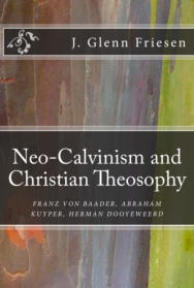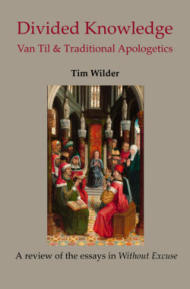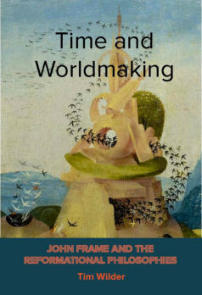



Neocalvinism, its successors & critics
Neocalvinism in its Netherlands and American contexts
Neocalvinism is most associated with the thought and political movements of Abraham Kuyper and Herman Bavinck in the Netherlands. Due to the institutions set up in the United States by Dutch immigrants, neocalvinism has taken on a second life in America. Crucial to this development is the fact that Kuyper in addition to his political activities was instrumental in founding a new Reformed denomination distinct from the state church, and the new Dutch immigrants in American looked to it for their identity. The distinctive ideas of neocalvinism are commonly said to be 1. A pluralist rather than hierarchical creation order under the sovereignty of God. This is called sphere sovereignty or differentiated responsibility. 2. A new concept of common grace where God relates to the created world distinctly from the operation of salvation and judgment under special grace. 3. A political program to mold social institutions by these principles. 4. A theory of knowledge where faith is the starting point, not a destination arrived at beginning from natural theology and proceeding by philosophical argument. 5. A total world view with norms that can be applied to all areas of society. Calvin and Common Grace by Herman Bavinck The Neo-Calvinism Research Institute, however, defines neocalvinism without reference to any of these but sees it as a world-transformative engagement with modernity. Ruben Alvarado (though with Christian Reconstruction’s appropriation of neo-calvinism in mind) puts it rather differently. “Dutch ‘neo-Calvinist’ movement whose founding father was Abraham Kuyper (1837-1920). Neo- calvinist, because (1) it made a big deal out of being Reformed, and (2) it discarded fundamental elements of the classical Reformed heritage. Neo-Calvinists (at least since Herman Dooyeweerd's ‘Cosmonic Idea’ school took over in the 1930s) denigrated that tradition's reliance on classical philosophy as represented by Plato, Aristotle, et al., and rejected the ‘pietistic’ emphasis on personal subjective religious experience so characteristic of earlier strict Reformed teaching. Even more crucial: neo-Calvinists rejected the theocratic mandate of a public establishment of religion as embodied in Article 36 of the Belgic Confession. In fact, in 1905 neo-Calvinists, under the leadership of Kuyper, excised the offending portion of that article. Kuyper proposed a radical distinction between the visible and invisible church, deemphasizing the role of the former in favor of the latter.” (Dominion Theology Meets the Kingdom of God) The New Legality In the Light of the Christian Philosophy of Law, by E. L. Hebden TaylorPost-neocalvinism
A variety of movements have emerged from this, themselves sometimes called neocalvinist. Most important is Klaas Schilder, who disputed some of the Kyperian ideas of common grace and about the covenant, but who continued an emphasis on culture. See: Christ and Culture and Heaven: What is It? There are also denominations and institutions that carry on his legacy. Also important is the Reformational philosophy of Herman Dooyeweerd, Vellenhoven and others, which is carried on in various places such as The Free University of Amsterdam and Toronto’s Institute for Christian Studies. Expressed in a turgid jargon and at great length its unapproachability has kept away students. Dooyeweerd derived his concepts from theosophy, as did previous neocalvinists, but gave them a much more extensive development. J. Glenn Friesen’s Neo- Calvinism and Christian Theosophy, Franz von Baader, Abraham Kuyper, Herman Dooyeweerd provides an in depth treatment of this. Two Paths of Reformational Philosophy: Early Writings of Vollenhoven and Dooyeweerd, by J. Glenn Friesen There is also Christian Reconstruction’s use of neocalvinism, which in its earlier phases more than later saw itself as following on from it. But the Reconstructionists sought to identify and implement specific Biblical norms for culture, rather then those which neocalvinism extrapolated from an abstract scheme about the spheres of social and cultural existence. More commonly people admire Kuyperianism for its rejection of the pietist withdrawal from culture and its insistence on a total Christian worldview, rather than its philosophical system. As this world view includes epistemology it is a more encompassing one than other worldviews, and this totalism is also seen as Kuyperian. Magnus Verbrugge, A New Look at Scientific Enquiry (Dooyeweerd’s philosophy of science) John Frame and the Reformational Philosophies debate The Amsterdam Philosophy: A Preliminary Critique, by John Frame (at frame-poythress.org/) Philosophy & Reformed Theology: Response to Frame, by Adolfo García de la Sienra (at Amazon.com) An analysis of the debate: Time and Worldmaking: John Frame and the Reformational Philosophies, by Tim Wilder - Epub - Kindle Format (kpf) - PDFFrederick Nymeyer vs neocalvinism.
Frederick Nymeyer was the founder of Libertarian Press, and an advocate of Austrian economic theory. A member of the Kuyperian Christian Reformed Church (CRC) he launched a campaign against his denomination’s neocalvinist views. Beginning in 1955 he published Progressive Calvinism, later renamed First Principles in Morality and Economics, and subsequently also a newsletter Social Action, Hundred Nineteen. He noted that the Kuyperian movement in the Netherlands had become statist by the time of German occupation of WW II and was now turning socialist. (The Anti-Revolutionary Party; The Founder was Confusilated from the Beginning And Now They Seem to have made a Volte Face) Neocalvinism was having the same effect in the United States at Calvin College and among CRC ministers. Kuyper, sphere sovereignty notwithstanding, failed to properly limit the role of the state. Second, during the war years, the Kuyperians tended to be collaborators with the Nazis, (What Happened To The Daily Newspaper Abraham Kuyper Founded?) on the theory that God ordained the powers that be, and that was now the German occupation. Nymeyer insisted on a distinction between power and authority. (“The Powers That Be Are Ordained of God”) “For us authority is limited to the idea of proper power, legitimate exercise of power, and responsible exercise of power.” 1. The ultimate source of authority is always God; 2. The responsibility for the exercise of that authority is also to God; 3. The right rules for exercising authority must be clearly stated in what is declared to be and accepted to be the special revelation of God or otherwise there is no practical significance to the statement that God is the source of authority. 4. Therefore, unless authority is based on the rules set by God that authority need not be obeyed. Those rules for Nymeyer were God’s law, which he understood as the Ten Commandments as Dutch confessions lack the reference to the general equity of the judicial laws found in the Westminster Confession 19:3. “Every allegation or implication that a government, whether good or bad, has a pipe line by which proper power is channeled to it directly from God is false.” “There is no dualism in Scripture, consisting of one set of rules for individuals and another and broader set of rules for government.” (“We Must Obey God Rather Than Men”) “Kuyper in matters of the theory of government followed what appears to have been his regular pattern — twin errors which approximately offset each other.” 1. Governments have arbitrary powers and must be obeyed, because the powers that be are of God. 2. The restoration of the liberty that was destroyed by number one is accomplishable by sphere sovereignty. As Nymeyer’s publications are hard to find, we are making available for researchers Progressive Calvinism and Social Action, Hundred Nineteen with permission from the Nymeyer estate.
Contra Mundum












Exercitation qui dolor dolor lorem proident commodo nisi.


© Lorem ipsum dolor sit Nulla in mollit pariatur in, est ut dolor eu
eiusmod lorem
Neocalvinis
m, its
successors &
critics
Neocalvinism in its
Netherlands and American
contexts
Neocalvinism is most associated with the thought and political movements of Abraham Kuyper and Herman Bavinck in the Netherlands. Due to the institutions set up in the United States by Dutch immigrants, neocalvinism has taken on a second life in America. Crucial to this development is the fact that Kuyper in addition to his political activities was instrumental in founding a new Reformed denomination distinct from the state church, and the new Dutch immigrants in American looked to it for their identity. The distinctive ideas of neocalvinism are commonly said to be 1. A pluralist rather than hierarchical creation order under the sovereignty of God. This is called sphere sovereignty or differentiated responsibility. 2. A new concept of common grace where God relates to the created world distinctly from the operation of salvation and judgment under special grace. 3. A political program to mold social institutions by these principles. 4. A theory of knowledge where faith is the starting point, not a destination arrived at beginning from natural theology and proceeding by philosophical argument. 5. A total world view with norms that can be applied to all areas of society. Calvin and Common Grace by Herman Bavinck The Neo-Calvinism Research Institute, however, defines neocalvinism without reference to any of these but sees it as a world- transformative engagement with modernity. Ruben Alvarado (though with Christian Reconstruction’s appropriation of neo-calvinism in mind) puts it rather differently. “Dutch ‘neo- Calvinist’ movement whose founding father was Abraham Kuyper (1837-1920). Neo- calvinist, because (1) it made a big deal out of being Reformed, and (2) it discarded fundamental elements of the classical Reformed heritage. Neo-Calvinists (at least since Herman Dooyeweerd's ‘Cosmonic Idea’ school took over in the 1930s) denigrated that tradition's reliance on classical philosophy as represented by Plato, Aristotle, et al., and rejected the ‘pietistic’ emphasis on personal subjective religious experience so characteristic of earlier strict Reformed teaching. Even more crucial: neo-Calvinists rejected the theocratic mandate of a public establishment of religion as embodied in Article 36 of the Belgic Confession. In fact, in 1905 neo-Calvinists, under the leadership of Kuyper, excised the offending portion of that article. Kuyper proposed a radical distinction between the visible and invisible church, deemphasizing the role of the former in favor of the latter.” (Dominion Theology Meets the Kingdom of God) The New Legality In the Light of the Christian Philosophy of Law, by E. L. Hebden TaylorPost-neocalvinism
A variety of movements have emerged from this, themselves sometimes called neocalvinist. Most important is Klaas Schilder, who disputed some of the Kyperian ideas of common grace and about the covenant, but who continued an emphasis on culture. See: Christ and Culture and Heaven: What is It? There are also denominations and institutions that carry on his legacy. Also important is the Reformational philosophy of Herman Dooyeweerd, Vellenhoven and others, which is carried on in various places such as The Free University of Amsterdam and Toronto’s Institute for Christian Studies. Expressed in a turgid jargon and at great length its unapproachability has kept away students. Dooyeweerd derived his concepts from theosophy, as did previous neocalvinists, but gave them a much more extensive development. J. Glenn Friesen’s Neo-Calvinism and Christian Theosophy, Franz von Baader, Abraham Kuyper, Herman Dooyeweerd provides an in depth treatment of this. Two Paths of Reformational Philosophy: Early Writings of Vollenhoven and Dooyeweerd, by J. Glenn Friesen There is also Christian Reconstruction’s use of neocalvinism, which in its earlier phases more than later saw itself as following on from it. But the Reconstructionists sought to identify and implement specific Biblical norms for culture, rather then those which neocalvinism extrapolated from an abstract scheme about the spheres of social and cultural existence. More commonly people admire Kuyperianism for its rejection of the pietist withdrawal from culture and its insistence on a total Christian worldview, rather than its philosophical system. As this world view includes epistemology it is a more encompassing one than other worldviews, and this totalism is also seen as Kuyperian. Magnus Verbrugge, A New Look at Scientific Enquiry (Dooyeweerd’s philosophy of science) John Frame and the Reformational Philosophies debate The Amsterdam Philosophy: A Preliminary Critique, by John Frame (at frame- poythress.org/) Philosophy & Reformed Theology: Response to Frame, by Adolfo García de la Sienra (at Amazon.com) An analysis of the debate: Time and Worldmaking: John Frame and the Reformational Philosophies, by Tim Wilder - Epub - Kindle Format (kpf) - PDFFrederick Nymeyer vs
neocalvinism.
Frederick Nymeyer was the founder of Libertarian Press, and an advocate of Austrian economic theory. A member of the Kuyperian Christian Reformed Church (CRC) he launched a campaign against his denomination’s neocalvinist views. Beginning in 1955 he published Progressive Calvinism, later renamed First Principles in Morality and Economics, and subsequently also a newsletter Social Action, Hundred Nineteen. He noted that the Kuyperian movement in the Netherlands had become statist by the time of German occupation of WW II and was now turning socialist. (The Anti- Revolutionary Party; The Founder was Confusilated from the Beginning And Now They Seem to have made a Volte Face) Neocalvinism was having the same effect in the United States at Calvin College and among CRC ministers. Kuyper, sphere sovereignty notwithstanding, failed to properly limit the role of the state. Second, during the war years, the Kuyperians tended to be collaborators with the Nazis, (What Happened To The Daily Newspaper Abraham Kuyper Founded?) on the theory that God ordained the powers that be, and that was now the German occupation. Nymeyer insisted on a distinction between power and authority. (“The Powers That Be Are Ordained of God”) “For us authority is limited to the idea of proper power, legitimate exercise of power, and responsible exercise of power.” 1. The ultimate source of authority is always God; 2. The responsibility for the exercise of that authority is also to God; 3. The right rules for exercising authority must be clearly stated in what is declared to be and accepted to be the special revelation of God or otherwise there is no practical significance to the statement that God is the source of authority. 4. Therefore, unless authority is based on the rules set by God that authority need not be obeyed. Those rules for Nymeyer were God’s law, which he understood as the Ten Commandments as Dutch confessions lack the reference to the general equity of the judicial laws found in the Westminster Confession 19:3. “Every allegation or implication that a government, whether good or bad, has a pipe line by which proper power is channeled to it directly from God is false.” “There is no dualism in Scripture, consisting of one set of rules for individuals and another and broader set of rules for government.” (“We Must Obey God Rather Than Men”) “Kuyper in matters of the theory of government followed what appears to have been his regular pattern — twin errors which approximately offset each other.” 1. Governments have arbitrary powers and must be obeyed, because the powers that be are of God. 2. The restoration of the liberty that was destroyed by number one is accomplishable by sphere sovereignty. As Nymeyer’s publications are hard to find, we are making available for researchers Progressive Calvinism and Social Action, Hundred Nineteen with permission from the Nymeyer estate.
MyWebsite.com


- Home
- About
- subjects
- French
- Temas
- Auteresindice
- Autores-org
- Autores-a
- Autores-b2
- Autores-ij
- Autores-d
- Autores-ef
- Autores-g
- Autores-h1
- Autores-c
- Autores-k
- Autores-l
- Autores-m1
- Autores-no
- Autores-pq
- Autores-r1
- Autores-r2
- Autores-b1
- Autores-h2
- Autores-s1
- Autores-s2
- Autores-t
- Autores-uv
- Autores-w1
- Documentos
- Perspectivas
- Eng-biblical
- Eng-law
- Eng-law-reviews
- Eng-education
- Eng-arts
- Eng-history
- Eng-economics
- Eng-biography
- Eng-brown
- Spa-recon
- Spa-anglicanos
- Spa-arte
- Spa-cosmovision
- Spa-iglesia
- Spa-pacto
- Spa-refeurop
- eng-federalism
- Spa-economia
- Spa-posreformados
- Spa-milenio
- eng-collections
- spa-etica
- spa-comun
- spa-epistemologia
- spa-t-historia
- blog
- spa-educacion
- spa-politica
- spa-filosofia
- portugues
- spa-reino
- spa-escolasticos
- eng-scolastics
- spa-neocalvinismo
- eng-neocalvinism
- espanol-libros
- sobre





























